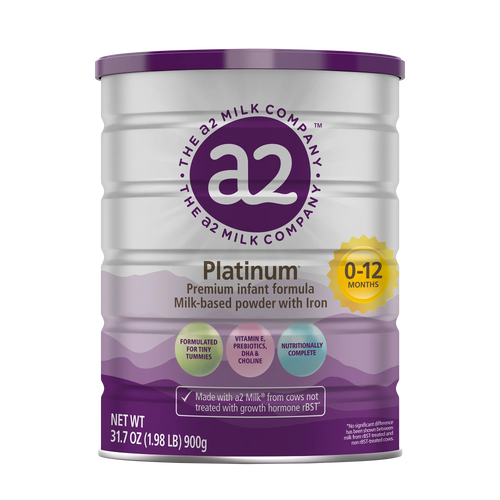The Science Behind A2 Beta-Casein Protein for Baby Formulas
With so many baby formula options available today, you're not alone in wondering what truly sets one infant formula apart from another.
As you navigate the overwhelming world of formula choices, understanding the science behind different formulations can help you make informed decisions about your baby's nutrition. This knowledge becomes particularly important when you're seeking the right formula for your baby's unique needs.
While breast milk remains the optimal choice for infant nutrition, when breastfeeding isn't possible or you plan to supplement breast milk with formula, choosing a high-quality infant formula becomes essential for your baby's healthy growth and development.
Discover what sets options like a2 Platinum® apart, formulated with a unique protein composition backed by scientific research and chosen by families worldwide to support their feeding journey.
Why Protein Type Matters in Baby Formula
When choosing an infant formula, it’s important to consider how the ingredients support your baby’s rapid growth and development, especially in the first year of life.
Many conventional infant formulas use ordinary cow's milk as their base, which naturally contains two types of beta casein protein: A1 and A2. However, some formulas use milk with only the A2 protein, which may be worth exploring when standard formulas aren't the right fit.
The Science of A2 Beta Casein Protein
Unlike ordinary cow's milk that contains both A1 and A2 proteins, a2 Platinum® is made with a2 Milk® whole milk from cows that naturally produce only the A2 protein.
This isn't about genetic modification. It's about careful cow selection. Through natural breeding practices, dairy farmers can identify and maintain herds of cows that produce milk that only contains the A2 type protein, similar to what was common in dairy farming centuries ago.
Scientific studies have examined how different beta-casein proteins behave in the digestive system. These proteins differ in structure, and some families explore different formulas to find the right fit for their baby.
Some parents prefer formulas with alternative protein profiles when exploring different feeding options for their baby’s comfort.
What's Inside a2 Platinum® Formula
a2 Platinum® infant formula offers a carefully balanced blend of over 30 essential nutrients to support your baby’s growth and development. Made with a2 Milk® whole milk as the base, this nutritionally complete formula is thoughtfully crafted for tiny tummies.
The protein and amino acid components include:
- A2 beta-casein protein as the milk protein source.
- Whey protein is included to help provide a complete amino acid profile.
- A balanced protein blend to support normal growth and development.
These protein sources work together to provide your baby with the building blocks needed to support proper growth and development.
Nutrient Highlights of a2 Platinum® Infant Formula
Key nutrients support important aspects of early brain and eye development:
- DHA and ARA play a role in normal brain and eye development.
- Choline supports neurological development.
- Essential fatty acids support brain and eye development.
These nutrients are crucial during the first year of life with the brain doubling in size during the first year of life.
Key vitamins play roles in normal physiological processes, including cellular function and bone development:
- Vitamin E contributes to antioxidant activity, which helps protect cells from oxidative stress.
- Vitamin D supports bone development and calcium absorption.
- Folic acid supports cellular development.
- Vitamin C (Ascorbic acid) contributes to normal cellular function, including antioxidant activity.
Key minerals lay the foundation for critical bodily functions:
- Calcium supports bone formation.
- Magnesium and zinc assist in metabolic processes.
- Copper and manganese support enzyme activity.
- Iron: Essential for transporting oxygen through the blood, supporting your baby’s brain development and cognitive growth.
These minerals play essential roles in everything from bone strength to cellular health.
Lactose is the Primary Carbohydrate
You can feel confident knowing that the primary carbohydrate in a2 Platinum® is lactose, the same naturally occurring sugar found in breast milk. Lactose serves as a vital energy source for growing babies and supports calcium absorption, which is essential for healthy bone development.
How a2 Platinum® Stands Apart From Other Formulas
a2 Platinum® is made with carefully selected ingredients and produced in facilities that meet strict safety and quality standards. With more than a decade of global use, it reflects a consistent approach to thoughtful formulation and manufacturing.
Here's what you won't find in a2 Platinum®:
- No palm oil or palm olein oil.
- No growth hormones. (No significant difference has been shown between milk from rBST-treated cows and non‑rBST-treated cows).
- No corn syrup solids.
- GMO ingredients.
These exclusions reflect a commitment to purposeful formulation and a focus on ingredients parents feel good about.
Instead, you'll find these quality ingredients that support your baby's health:
- Whole milk is the first ingredient, not skim milk powder.
- Coconut and sunflower oils contribute to the fat blend, supporting energy needs and fat-soluble nutrient absorption.
- Lactose is the primary carbohydrate.
- Mixed tocopherols (a form of vitamin E) help preserve freshness naturally.
Clean Label Certification
You can feel confident knowing that with Clean Label certification, a2 Platinum® has earned the trust of millions of families worldwide. This extensive track record demonstrates a consistent commitment to quality and safety standards that you can rely on.
The formula is manufactured in state-of-the-art facilities with rigorous testing protocols. This ensures each batch meets the highest safety and nutritional standards for infant nutrition.
Supporting Your Baby's Comfort and Development
True lactose intolerance in infants is extremely rare. According to the American Academy of Pediatrics, it affects less than 5% of babies under 12 months. More commonly, feeding discomfort may relate to how specific proteins are processed in your baby's developing systems.
For babies with a diagnosed cow's milk protein allergy, specialized formulas are required. When regular formulas aren’t well tolerated, it’s important to work with your pediatrician to explore alternative protein formulations that may be a better fit.
Parents choose a variety of formulas to meet their baby’s needs, including ones that differ from ordinary cow’s milk, such as a2 Platinum®, which is made with milk from cows that naturally produce only the A2 beta-casein protein. Parents may explore formulas made with A2 protein milk for alternative protein profiles, always in consultation with their pediatrician.
Many parents begin exploring formula alternatives when their baby experiences:
- Discomfort during or after feeding
- Fussiness or irritability
- Irregular or hard stools
- Trouble sleeping related to feeding challenges
In these cases, a different protein source could offer a gentle and nutritionally complete option to consider.
If you suspect your baby has formula-related issues, consult your pediatrician before making changes. They can help determine the best course of action for your baby's specific needs. Remember, every feeding journey is different, and finding what works may take time and patience.
Making the Right Choice for Your Baby
Choosing the right infant formula can feel overwhelming, but keeping a few guiding principles in mind can help.
When you're evaluating formula options, look for these key factors:
- Whole milk as the primary ingredient rather than skim milk reconstructions.
- Complete nutritional profiles including essential vitamins and minerals.
- Clean ingredient lists without unnecessary additives.
- Established safety records from trusted manufacturers.
These factors work together to help ensure your baby receives the highest quality nutrition possible during this critical development period.
Before you make any changes to your baby's feeding routine, healthcare providers can help determine whether switching formulas is appropriate for your baby's specific needs. They can also monitor your baby's growth and healthy development.
If you're just starting formula feeding, your pediatrician can guide you through the process and help you understand what to expect during the transition.
When you're discussing formula options with your healthcare provider, consider mentioning these key points:
- Any digestive discomfort your baby experiences.
- Feeding patterns and behaviors.
- Growth and development concerns.
- Interest in A2 protein alternatives.
This information helps your pediatrician make the best recommendations for your baby's unique situation.
If your pediatrician recommends trying a different formula type, it is typically recommended to make gradual transitions. Switching formulas should be done thoughtfully and with medical guidance to ensure that your baby continues to receive optimal nutrition throughout the transition process.
You want to monitor your baby's response carefully during any formula change, watching for improvements in comfort and continued healthy growth. Learning proper bottle feeding techniques can also help ensure your baby gets the most benefit from their new formula. Trust yourself as a parent while staying open to guidance from healthcare professionals.
Finding Confidence in Your Formula Choice
Every parent deserves access to high-quality nutrition options for their baby. Understanding the science behind different formula types empowers you to make informed decisions that support your baby's health and development.
While breast milk remains the gold standard for infant nutrition, when formula feeding becomes necessary, choosing options like a2 Platinum® ensures your baby receives complete nutrition. This formula is designed with your baby's developing systems in mind.
It is always recommended to consult your pediatrician when making decisions about your child's feeding. Remember that finding the right formula for your baby is an important step in supporting their healthy growth and development.
Every parent deserves peace of mind. With a2 Platinum®, you can feel confident that your little one is getting gentle, science-backed nutrition from the milk experts.
Visit a2 Platinum® for more feeding tips, expert advice, and first-year insights on infant nutrition.






